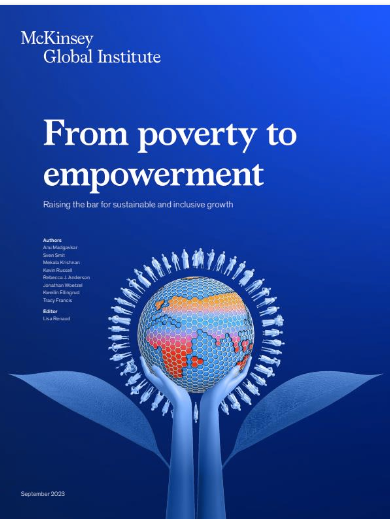Addressing climate AND social issues simultaneously - can it be done?
- Mathew Jensen

- Oct 18, 2023
- 2 min read
All of us doing faith-consistent investing are in some way addressing underlying environmental AND social issues, and we wonder – can we pursue both at the same time? With what tradeoffs? At what cost? Over what time-horizon?

McKinsey Global Institute (MGI) out with a study From Poverty to Empowerment looking at concurrently 'addressing both poverty and climate change in a decisive way…' to understand what are the costs and tradeoffs involved. It’s a huge report at 136 pages, the executive summary alone is 40 pages, and it defines, takes pages to calculate, and hinges on two “gaps”:
'Empowerment Gap' – The boost in spending power needed for everyone to reach the empowerment line (the point at which they can meet all essential needs and start to save).
'Net-zero Investment Gap' - The boost in low-emissions spending needed above 2020 levels to get on a net-zero trajectory.
The headline costs, with details on methodology and calculations in the report, are massive, as expected – US$37 trillion to close the empowerment gap, US$41 trillion to close the net-zero gap. By comparison total world GDP in 2022 was US$100 trillion (World Bank).
How to fund these gaps?
The report is almost fully focused on 'how much market forces can deliver' due to the very size of the two challenges. In its 136 pages 'regulation' is mentioned just 6 times, economic reform and variations none, 'innovation' 153 times, and 'growth' 531 times – 'We find that accelerated growth and business innovation could take the world halfway to closing the combined gaps. Companies can make major contributions and benefit from new opportunities, even under current policy frameworks' pointing, in part, to the track record - 'more than a billion people have exited extreme poverty in recent decades' under this same approach. The report is somewhat short on details for how to do this other than 'some combination of public funding and changed market incentives'.
How to close the rest of the gap? '…the remaining economic gaps leave societies with choices about whether to address both challenges in full, in part, or not at all. Countries might prioritize one of these transformations over the other, or leave both unaddressed beyond what market forces can do…'
Why Growth?
The report briefly addresses other models, such as “degrowth” or 'well-being economics' but notes that 'Major societal endeavors, such as the push to get to net zero, are more likely to win public buy-in when the pie is expanding'.





